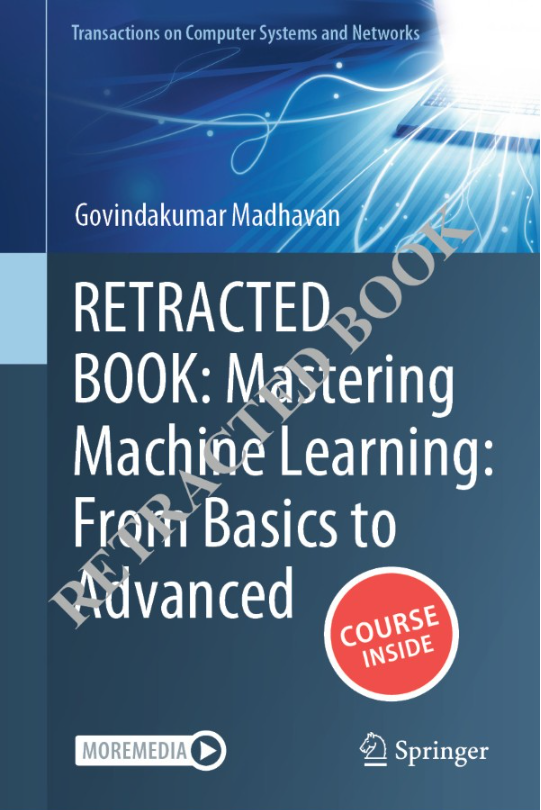Springer Nature has officially retracted a book on machine learning following coverage by Retraction Watch. A reader sent us a tip about this book; we’d love your help identifying more.
As we reported, the book, Mastering Machine Learning: From Basics to Advanced, contained many citations to nonexistent works. These fake references are a hallmark of text generated by large language models like ChatGPT.
The retraction notice mentions the illusory citations, stating, “Following publication concerns were raised regarding the validity of certain references. Upon further investigation, the Publisher was unable to verify the source of 25 out of 46 references in this book.” After listing the 25 citations, 12 of which we found in our initial reporting, it continues, “the Series Editor and the publisher therefore no longer have confidence in the reliability of this book. The author has not stated explicitly whether he agrees with this retraction.”
The website for the book remains intact, with each chapter labeled “Retracted Chapter,” the title appended with “Retracted Book” the cover image watermarked.
Following our story, we received multiple tips from readers about other books with fake citations. Do you know of another recently published book with citations that don’t check out? Tell us about it here. On the form, we ask you to point to specific citations that are not real. We’ll take it from there.
Like Retraction Watch? You can make a tax-deductible contribution to support our work, follow us on X or Bluesky, like us on Facebook, follow us on LinkedIn, add us to your RSS reader, or subscribe to our daily digest. If you find a retraction that’s not in our database, you can let us know here. For comments or feedback, email us at [email protected].

In “Artificial Intelligence-Empowered Modern Electric Vehicles in Smart Grid Systems: Fundamentals, Technologies, and Solutions”, ed. Aparna Kumari, and Sudeep Tanwar. Amsterdam: Elsevier.
Chapter 14
https://www.sciencedirect.com/science/article/pii/B9780443238147000146
“Certainly, here’s an extended version of the proposed approach that includes
a Simulation/Experimental Results section with the addition of graphical and
tabular representations of the results:” (p. 406)
Chapter 16
https://www.sciencedirect.com/science/article/pii/B978044323814700016X
“I don’t have access to real-time data, so the following list may not reflect the most current rankings. Nevertheless, here are 10 EVs that were at the forefront of AI technology in 2021:” (p. 469)
As I nowadays encounter these almost weekly when peer reviewing, I think we, including all major publishers, urgently need software for automating detection already at the initial submission step. Someone at ETH tried prototyping recently but apparently it is not easy (https://spylab.ai/blog/hallucinations/). Thus, maybe we need a simple policy change: all references should come with DOIs, ISBNs, or URLs?